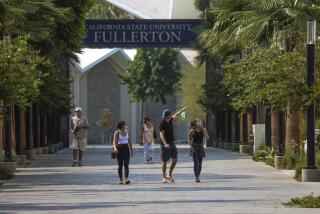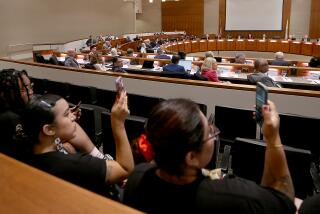Colleges Fear Proposed Tax on Students
- Share via
EVANSTON, Ill. — Praised as a municipal sugar daddy and damned as the town’s No. 1 deadbeat, prestigious Northwestern University is squared off with city fathers here in a unique tax spat that could ripple through the academic world.
Sometime this month, the City Council in this tony Chicago suburb of 73,000 permanent residents is expected to take up a plan to slap a novel tuition tax on Northwestern’s 10,500 students. It would also apply to students at three smaller colleges in the community.
Both critics and supporters of the tax say that the vote will be close. However, if the measure is passed and clears expected court challenges, educators fear a wave of copycat ordinances in cash-strapped college towns across the country.
“All local jurisdictions are looking for sources of revenue,” said Robert Rosenzweig, president of the Washington-based Assn. of American Universities. “If this succeeds in one place, it’s bound to be attractive to others . . . . I think it’s a disastrous idea.”
But backers of the tuition tax say that Northwestern is a drain on city coffers at a time when the treasury is in the red and homeowners have been socked with skyrocketing property tax bills. They complain that the school uses public services but pays no property taxes and stints on voluntary contributions for the upkeep of parks, roads, sewers, fire equipment and the like.
“This university has been so unbelievably chintzy,” charged Sidney Zwick, a Northwestern alumnus who heads a local senior citizens’ group. “It’s putting an unconscionable burden on our senior citizens.”
Under the plan, Evanston would levy a 0.5% tax on tuition paid by students at Northwestern, nearby Kendall College and two theological seminaries. At current tuition rates, running shy of $14,000 a year for Northwestern, city officials estimate that the tax could raise $732,000, about half the municipal deficit. It would cost the average Northwestern undergraduate a little over $65 annually.
That may not sound like much, but it has raised howls of protest from faculty and students, who contend that tax supporters have wrongly portrayed Northwestern as a bastion of privilege where most students can lean on affluent parents to pay the freight.
That is not so, argued Arva Rice, a senior whose college career has been dependent on financial aid programs. “The rich kid image that a lot of us have at Northwestern isn’t really true,” Rice told a public hearing on the tax plan this week.
John Byrne, another senior, said he had to pinch pennies and borrow more than $12,000 to finish school. “Sixty-five dollars to a student is a hell of a lot of money,” he said. “Sixty-five dollars can help me pay my rent. It can buy two weeks of groceries.”
Michael Weston, Northwestern’s vice president for legal affairs, denied that the school has ignored its civic responsibilities. For example, Weston said, Northwestern has spent $9 million and pledged up to $16 million more to help Evanston develop a research park to attract new business and broaden the local tax base.
More important, Weston pointed out that the 139-year-old school, the only private university in the Big Ten athletic conference, is not only Evanston’s largest employer but its chief claim to fame. “Higher education is the enterprise that has made Evanston known worldwide,” Weston said. “To penalize people for pursuing that education is wrong.”
Cost-sharing frictions are by no means unique to Evanston. Large private and public universities often provide a major source of jobs and retail spending revenue in their communities, not to mention a wide range of cultural and recreational activities that might otherwise not be available to residents. But, as nonprofit institutions, they also remove significant chunks of land from the tax rolls.
In fatter days, it was a trade-off that college towns accepted willingly. Now, squeezed by rising costs, cutbacks in state and federal aid and revolts by taxpayers, more and more municipalities are putting the arm on schools to voluntarily underwrite city programs.
“With (a) loss (of) federal revenues, cities have been forced to turn elsewhere to make up the losses,” said David Stewart, the director of community relations for Cornell University in Ithaca, N.Y. “Colleges and universities are seen as golden geese.”
Many schools are trimming programs and frills to cope with their own budget problems. Still, Stewart said, a 1988 Cornell survey showed that many universities had begun to make payments in lieu of taxes for local government services they may have once gotten for free.
Cornell, for example, will pay the city of Ithaca $125,000 for fire protection this year and will also cover $250,000 in operating deficits for the Tompkins County bus system, which the school operates under contract.
Yale University has agreed to contribute more than $2 million to New Haven, Conn., where it is situated, to help defray a large city budget deficit. In Massachusetts, Harvard University last year paid more than $2 million in lieu of taxes to the cities of Cambridge and Boston, where it has property.
Under pressure from their home towns, three campuses in the University of California system also have recently worked out agreements to help ease the budget problems of local authorities.
The Berkeley campus bought a $300,000 fire engine for the city and agreed to fund the salary of an extra staff member for the city planning department. At Davis, the school has committed $3 million to help pay for road improvements and other community development projects and has agreed to restructure its growth plans to favor leasing arrangements over land or building purchases that remove property from the tax rolls.
Similarly, at Santa Cruz, the university has agreed to share in improvement expenses with the city. It drastically scaled back expansion proposals after city officials expressed fears that the community of 50,000 could not cope with the school if, as planned, it tripled in size over the next 15 years.
“That was a recognition of the inability of the municipal government to deal with the impacts of our growth on its own,” Stephanie Hauk, the assistant chancellor for university advancement, explained.
Both history and modern-day realities have combined to make the dispute between Evanston and Northwestern more bitter than most. Northwestern, founded in 1851 by Methodist ministers, actually predates the city, which grew up around it on the Lake Michigan shoreline, just north of the Chicago city limits.
Nearly half of Northwestern’s 3,100 faculty members live in Evanston, but, over the years, the city has largely evolved into a well-to-do bedroom community where most residents have no ties to the school.
Few if any schools pay real estate taxes on land used for educational purposes. But the original charter granted to Northwestern by the Illinois Legislature gives the school an extraordinary exemption from taxes even on property it owns and leases out for investment purposes. Over the last two decades, the school has sold off most of that land, but it still owns more than two acres of highly prized and tax-free commercial development property in the vicinity of downtown Evanston.
Sponsors of the tuition tax admit that the idea is an end run designed to get around legal prohibitions against taxing the school directly. “I’m not trying to ruin the university,” Jack Korshak, the author of the tuition plan in the City Council, said. “I’m just saying everyone should pay his fair share. Our taxes are murder now.”
Korshak floated a similar tuition tax plan several years ago, but it was soundly rejected by his council colleagues. This time, however, its chances of passage appear greatly improved. In a recent survey by a council committee, 14 out of the 17 members of the full council said they would be willing to at least consider the idea.
Although she agreed not to try to block debate, Marjorie Collens, the chairman of the council’s Budget Policy Committee, said that the notion of taxing students or education was “bad policy and bad business” for Evanston. “It holds us up to the entire country as being anti-education and foolish,” she said.
More to Read
Sign up for Essential California
The most important California stories and recommendations in your inbox every morning.
You may occasionally receive promotional content from the Los Angeles Times.













